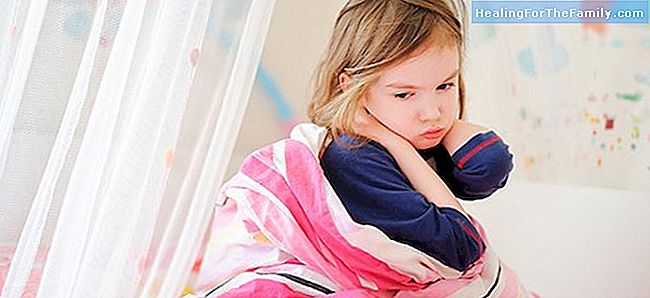Infant enuresis is hereditary
Controlling children's enuresis is a difficult mission, but not impossible because it is usually due to medical causes that have treatment. Dr. Juan Carlos Ruiz de la Roja , author of the book ¿Why do children urinate in bed? Answers of a doctor , assures in this interview to GuiaInfantil.com that i
Controlling children's enuresisis a difficult mission, but not impossible because it is usually due to medical causes that have treatment.Dr. Juan Carlos Ruiz de la Roja, author of the book ¿Why do children urinate in bed? Answers of a doctor, assures in this interview toGuiaInfantil.com that in 90 percent of cases, children's enuresis is hereditary. The treatment of enuresis of children in each case will depend on the diagnosis to determine the causes. Control of children's nocturnal enuresis
Is enuresis inherited from parents to children?

Enuresis is a hereditary problem, to the point that in 90 percent of cases there is a family inheritance, which can come from parents, even close relatives as uncles. In the event that the father and mother have urinated, it is likely that 75 percent of the offspring have the problem and, if only the father or mother has urinated, approximately 50 percent of the children will suffer from enuresis.
Why do girls leave diapers before children? Is it easier to get sphincter control in girls than in boys? If so, why?
The problem of enuresis lies in a delay in the maturation of the bladder, on the one hand, and on the other, in the hormonal maturation. In such a way that these children have a smaller bladder and a greater production of urine. With the growth and development of children, the problem of enuresis is disappearing. But, what is happening? That children usually take longer to mature than girls and, for this reason, girls get control over their sphincters before children.What is enuresis? When can it be said that a child has enuresis? At what age is a child considered to have enuresis?
A child presents enuresis when he has reached the age of 5 years and continues to urinate a minimum of four nights over a month, for at least three months. If the child meets these requirements we should consult a urologist.What is the right time to take children with urinary incontinence problems to the doctor?
We must take the child to the specialist or the urologist whenever the child is 5 years old and we have not been able to remove the diaper at night. In 90 percent of cases, children's enuresis has a medical cause and you have to diagnose by performing some medical tests, which are very simple, but that can lead us to know what is the exact reason why the child urinates for choose the most appropriate treatment.What can cause enuresis in children? Where do the causes of childhood enuresis reside? Are they more physical or psychological?
The causes of childhood enuresis are medical in 90 percent of cases and psychological in the remaining 10 percent. Among the medical causes, the most common are, on the one hand, that children produce more urine than normal due to diabetes, for example, or on the other, that they have a delay in the maturation of their bladder, which means have a lower capacity bladder, and therefore, retain less urine. Within psychological causes, the beginning school, the separation of parents or the birth of a brother are the most common.What physical or psychological consequences can a child with enuresis have?
The consequences of wetting the bed are tremendous, especially from a psychological point of view. They are children who socialize much worse because they usually do not go to camps, they do not go to friends' houses to sleep and they are children who sleep badly because they think that in the middle of the night they will urinate, and they keep awake, their sleep is not deep and this makes the child's school performance much lower.Should the child be punished for urinating in bed? What consequences can the punishment of the problem of enuresis of children represent?
Never have to punish a child who urinates at night in bed because in 90 percent of cases the child has a physical problem that can not be controlled. Therefore, the child is not guilty of what happens to him. If we punish him, it is a double punishment or suffering because the child does not want to urinate, it is a physical cause that he can not control. If we punish him we can cause him a psychological disorder and end up with fears and problems that can affect him when the child is an adult.Should parents give prizes to children who can make progress in treating bedwetting?
Children with enuresis, on the other hand, do have to be rewarded. If our son starts to move forward because he no longer urinates, these children have to be rewarded. Within the enuresis we have to talk about stimuli in positive and never in negative. The child should never be repressed or punished for having peed in bed.Marisol Nuevo.












